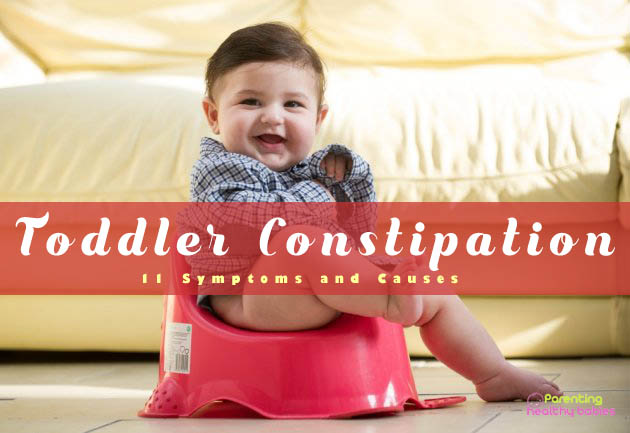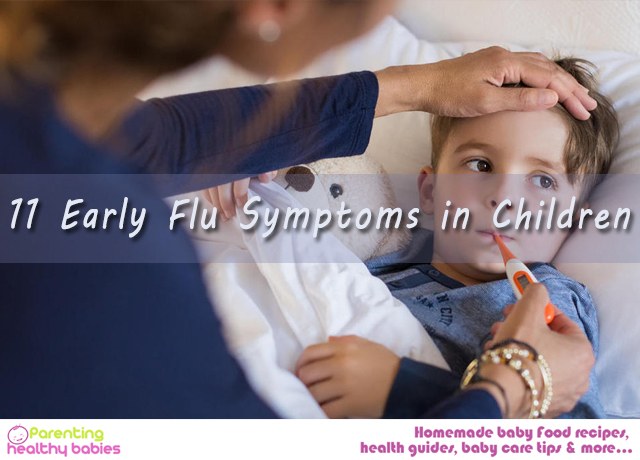Less bowel movement, hard and dry bowel, large diameter of the stool, pain while passing stool, abdominal pain, traces of stool in your child’s underwear, blood on the surface of the hard stool are some of the symptoms of constipation in toddlers.
Constipation is a very common problem among children. A constipated child will suffer from irregular bowel movements. The stool will also be dry and hard. There are various causes and symptoms of toddler constipation.
Stool will be very irregular. Less than 3 time a week. The bowel will be hard and dry. The stool will be difficult to pass and will be very large in diameter. There will be tremendous pain during the passing of the stool. There will be abdominal pain and discomfiture. There will be traces of stool in your child’s underwear. This is a sign that the stool is backed up in the rectum. On some occasions, there will be blood found on the surface of the hard stool.
There are many things which trigger constipation amongst children and especially toddlers. Withholding stool is one of them. A sudden change in diet is also another major cause of constipation. A change of routine also disrupts the normal stool passing habit. There can be issues pertaining to toilet training also. Sometimes medications and allergies are also to be blamed for constipation amongst toddlers. If you have a family history of people suffering from constipation then your child can also be a victim.
Toddler Constipation: 11 Symptoms and Causes
Symptoms of constipation in Toddlers:
- Less Bowel Movement: If you notice that your child is undergoing less than 3 bowel movements per week then it is a definite sign of constipation. Anything above that can be regarded as safe and ignored. (Hyman, 2006).
- Hard and Dry Bowel: The bowel would be hard and dry. Your child will face difficulty in passing the stool.
- Large diameter of the stool: Constipation piles up the stool inside your child’s body. That is why when it comes out it is normally large in size and shape. (Tabbers, 2014).
- Pain while passing stool: Your child will face extreme pain and discomfort while passing the stool. Constipation happens due to the lack of lubrication in the anal passage. The friction of the dry stool against the anal passage causes the pain and discomfort.
- Abdominal Pain: Your child will suffer from tremendous abdominal pain on occasions. It might also give him/her sleepless nights. The pain might start immediately after having food or water.
- Traces of stool in your child’s Underwear: Traces of clay-like stool can be found on your child’s underwear. This happens mostly due to the leaks which happen when the hard stool puts pressure on the rectum. Your child will also urinate more due to the same reason.
- Blood on the surface of hard stool: Due to the hardness and dryness of the stool it will break the tender skin of the anal passage. This will make your child bleed a bit. However, it is nothing dangerous or alarming. It is very common during constipation.
If your child is suffering from constipation then he/she might develop a fear that the bowel movement will hurt. You can observe signs like crossing of legs, clenching of buttocks, twisting the body during sleep, and obvious facial expressions suggesting that he/she is holding back stool. (Hyman, 2006).
Causes of Constipation in Toddlers:
There are several causes which trigger constipation in toddlers. Since toddlers undergo a lot of dietary change during a short span of time their digestive tract needs more time to adjust. That is why constipation is very common.
Withholding:
Toddlers, due to their apparent immaturity, have this annoying habit of withholding urine and stool. When the stool is not passed on its specific time period it hardens pretty quickly. This leads to constipation among toddlers. In some cases, they might be uncomfortable using the toilets in school and might shy away from telling the concerned person. (Tabbers, 2014).
If your child once develops the trauma of passing stool then this problem might become acute. One painful experience might lead to many in the future.
Issues with toilet training:
If you push the toilet training agenda too hard then your child will become a rebel and start practicing withholding. That will affect his/her toilet habits for a long run. Instead, you should soothe your child into the habit and help him/her to pass the stool naturally.
Changes in Diet:
A sudden change in diet can also cause constipation in your child. Especially when you are travelling with your family to some other location or country then the change of food will definitely impact your child’s digestive system. Your toddler’s digestive tract is not as adaptive as an adult’s and that is why they face more challenges in the process of changing the diet. (Hyman, 2006).
Change in Routine:
Similar impact occurs when there is a sudden change in the routine. A change of place, a change of weather, or the change of timing of school can also impact your toddler’s bowel movement. Your toddler’s body will require more time to adopt to the change of environment.
Milk Allergy:
Consumption of too many dairy products can lead to the hardening of stool for many children. Sometimes it is the cause of an allergenic reaction which causes dehydration and eventual constipation. It impacts the overall digestive system of your child. (Baker, 1999).
Lack of Drinking Water:
Many children do not develop the habit of drinking enough amount of water. This jeopardizes the digestive system of the child. It leads to eventual hardening of the stool and constipation.
Acute Medical Conditions:
In some occasions, constipation is a result of some acute medical conditions like anatomic malformation. This is a chronic metabolic and digestive disorder detect in infants. In such cases, the parents need to visit a doctor.
Family History:
Genetics can also be blamed for constipation among children. Children belonging to a family of constipated members are likely to develop early age constipation. It can also be the cause of shared environment and similar food habits. If the problem is being passed on from generation to the other, the parents might think of changing the diet for the child.
Although most of the problems surrounding constipation can be cured at home there are some occasions when you need to seek the doctor’s help.
When to Call the Doctor?
Most of the cases of toddler constipation are not acute or serious. Drinking enough water and adding high fiber foods in the diet is enough to help them recover. However, if constipation is happening due to some underlying medical condition then that needs to be sorted out. You can make a doctor’s visit if any of the following problems become visible:
- Constipation accompanied by high fever is not a positive sign.
- If your child is vomiting a lot then also it is something negative
- If the amount of blood in stool is increasing on a daily basis. (Some blood will appear due to the tear of the anal membranes. But if they keep on increasing then it is a matter of concern).
- Swelling of the abdominal region is an obvious sign of worm or bacterial infestation.
- The presence of anal fissures (tears in the skin surrounding the anus of your child)
- Rectum coming out of the anus is a sign of a fatal disorder and should be immediately addressed by a medical professional.
Constipation can be avoided in children by many ways. You should feed your child high-fiber foods including whole-grain cereals, vegetables and beans. This will promote the formation of roughage allowing the passing of the stool. Encourage your child to intake plenty of fluids and conduct a lot of physical exercises. Lack of body movement often hinders the metabolism and eventually causes constipation.
Regular intake of water and other fluids will also keep the digestive system healthy. Encourage your child answer to the nature’s call and remind him/her that withholding will cause more problems in the future. Do not develop a trauma during toilet training and try not to push him/her too hard.
Hope this article was of help for all our parents!! Please share your comments/queries/tips with us and help us create a world full of Happy and Healthy Babies!!
References:
https://www.mayoclinic.org/diseases-conditions/constipation-in-children/symptoms-causes/syc-20354242
http://www.gastrojournal.org/article/S0016-5085(06)00517-8/abstract













